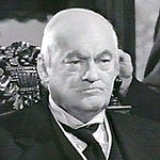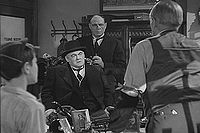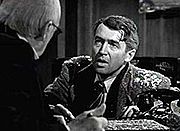
Mister Potter
Encyclopedia

Frank Capra
Frank Russell Capra was a Sicilian-born American film director. He emigrated to the U.S. when he was six, and eventually became a creative force behind major award-winning films during the 1930s and 1940s...
film It's a Wonderful Life
It's a Wonderful Life
It's a Wonderful Life is a 1946 American Christmas drama film produced and directed by Frank Capra and based on the short story "The Greatest Gift" written by Philip Van Doren Stern....
. He occupies slot #6 on the American Film Institute
American Film Institute
The American Film Institute is an independent non-profit organization created by the National Endowment for the Arts, which was established in 1967 when President Lyndon B. Johnson signed the National Foundation on the Arts and the Humanities Act...
's list of the 50 Greatest Villains in American film history (in its 2003 list entitled AFI's 100 Years... 100 Heroes and Villains
AFI's 100 Years... 100 Heroes and Villains
AFI's 100 Years... 100 Heroes and Villains is a list of the 100 greatest screen characters chosen by American Film Institute in June 2003. It is part of the AFI 100 Years… series. The series was first presented in a CBS special hosted by Arnold Schwarzenegger...
). Mr. Potter was portrayed by veteran actor Lionel Barrymore
Lionel Barrymore
Lionel Barrymore was an American actor of stage, screen and radio. He won an Academy Award for Best Actor for his performance in A Free Soul...
.
The persona of Mr. Henry F. Potter
Throughout the entire film, Henry F. Potter is a heartless, cold, apathetic, and downright evil man. Everything that Mr. Potter does in the film is motivated by money and greed. Be it "saving" George BaileyGeorge Bailey (fictional character)
George Bailey is a fictional character and the main protagonist in Frank Capra's 1946 film It's a Wonderful Life. He is played by James Stewart. He is loosely based on George Pratt, a character in Philip Van Doren Stern's The Greatest Gift....
's clients during a bank run
Bank run
A bank run occurs when a large number of bank customers withdraw their deposits because they believe the bank is, or might become, insolvent...
or offering George the job of his dreams, all are thinly veiled plots to fill his own wallet.
Not much is revealed about his personal life aside that he is single, and never has had a wife, children or any close or distant family members, and he uses a wheelchair for reasons that are never explained (which is due to the actor Lionel Barrymore's real-life health conditions). Because of his disability, Potter always has the same mute bodyguard by his side, who travels with him wherever he goes and pushes his wheelchair for him.
Though he is also a mill owner, banker and slumlord, Mr. Potter is a businessman at heart. If there's one thing he's talented at besides making people's lives miserable, it's his ability to manage, plan, and keep order. During the whole length of the film, he seems particularly deft in the ways of finance and business, much to the chagrin of the good people of Bedford Falls. His business propositions may seem fair, even charitable at first, but his ulterior motives are of a far more sinister nature. Thus, he will stop at nothing so long as it means more money in his coffer and the downfall of the Bailey Building & Loan. In his first appearance in the film, he is seen being transported in a decorative horse and buggy
Horse and buggy
A horse and buggy or horse and carriage refers to a light, simple, two-person carriage of the late 18th, 19th and early 20th centuries, drawn usually by one or sometimes by two horses...
, which causes the Angel 2nd Class Clarence Odbody (who is researching George's life) to ask "Who's that, a king?", to which his superior, Joseph, answers "That's Henry F. Potter, the richest and meanest man in the county!"
Early encounters
In 1919, Mr. Potter, even before the story starts, has already tried many times (albeit fruitlessly) to nab the Building & Loan company from Peter Bailey, proprietor for many years. His first run-in with George Bailey was in the middle of a business meeting, when a very young George needed to ask his father, Peter Bailey, an urgent question about chemicals as he found cyanide in a child's medicine bottle at work. Potter is annoyed at Peter Bailey for refusing to foreclose on debtors who are past due, whereas Peter rebuts by saying the economic downturn has hit people hard, which will only be worsened by immediate foreclosures. When Henry Potter berates the elder Bailey, this infuriates the younger Bailey, who interrupts the business meeting to tell Potter he is nothing but mean-spirited. To Potter, this action by George convinced him further that the Bailey clan was annoyingly upstanding.When Peter Bailey dies from a sudden stroke some years later, a 20-year old George must abandon his dreams of going off to college or traveling the world. Mr. Potter takes advantage of the crisis by attempting to take control of the Bailey Bros. Building & Loan, which he admittedly has the right to do as the principal shareholder in the company. The bereaved George must fend off Potter in order to save the Building & Loan. The rest of the savings bank's board of trustees endorses George's leadership, thwarting Potter's plans to take complete control of the Bedford Falls financial market; but it ends up costing George heavily. The board's decision is contingent upon the son taking over full-time management of the struggling, marginal business.
In one scene, Potter scoffs at the idea of a lowly man such as Ernie Bishop, the taxi driver, receiving a loan because George can vouch for his character. Potter snorts, "What does that get us? A discontented, lazy rabble instead of a thrifty working class." At that, George Bailey protests that those hard working people deserve a decent standard of living such as owning a properly equipped home, which the reasonable loans provided by the Building and Loan makes possible.

Bank run
A bank run occurs when a large number of bank customers withdraw their deposits because they believe the bank is, or might become, insolvent...
at the Building & Loan, Mr. Potter tries again to cripple the company. He offers fifty cents ($0.50) on the dollar for George's clients to put their accounts in Potter's bank. George refuses, and instead creatively offers each client his own honeymoon money ($2,000) to hold them over until the week ends, when the money arrives in the Building & Loan vaults, and the depositors decide to trust George, withdrawing no more than what they need for the week.
First real attempt: Temptation
Years later, Mr. Potter's own investments and income are threatened by Bailey Park, a new suburb-like development upstart by George's company. Complaining that the Building & Loan has "been a boil on my neck long enough," Mr. Potter summons George to his office and extends him the job offer of his dreams. On condition that he turn the Building & Loan over to Potter, George will receive a plentiful salary with a bonus.Mr. Potter, by this time, knows that George has always wanted but never received. There are four things Potter knows that George has always desired, and implements these in a dastardly scheme to coax the Building & Loan from George's safe hands.
Sensing George's desire to leave Bedford Falls behind and see the world, Mr. Potter proposes George an incredibly profitable career at Potter's company, running all of Potter's properties and financial affairs. George is offered an immense salary, benefits and business trips to New York City and maybe even Europe.
George initially takes the bait, and asks for 24 hours to talk it over with his wife, Mary. Potter agrees to let George think his offer over. But once he shakes Mr. Potter's hand, George somehow has an epiphany when he realizes Potter's true intentions, and refuses him.
Second real attempt: Arrest (and making George consider suicide)
During World War II, Mr. Potter becomes head of the draft board in Bedford Falls. He is satisfied to see that George is ineligible to serve on the war front because of deafness in one of his ears; it is a scar and trophy from when his brother Harry fell through the ice at the age of nine and George rescued him from the freezing waters. Instead, George stays behind and fights the "Battle of Bedford Falls", supervising scrap metal drives and allocating ration coupons.On Christmas Eve 1946, George's brother Harry (serving as a U.S. Naval Aviator
Naval Aviator
A United States Naval Aviator is a qualified pilot in the United States Navy, Marine Corps or Coast Guard.-Naming Conventions:Most Naval Aviators are Unrestricted Line Officers; however, a small number of Limited Duty Officers and Chief Warrant Officers are also trained as Naval Aviators.Until 1981...
) is to return to Bedford Falls after being decorated with the Medal of Honor
Medal of Honor
The Medal of Honor is the highest military decoration awarded by the United States government. It is bestowed by the President, in the name of Congress, upon members of the United States Armed Forces who distinguish themselves through "conspicuous gallantry and intrepidity at the risk of his or her...
for saving the lives of countless soldiers on a troop transport in the war. George's scatterbrained Uncle Billy, an associate of the Building & Loan since Peter Bailey's days, arrives in Potter's bank with $8,000 to deposit and a newspaper in his hand. The miser is wheeled into the bank in his wheelchair by his long-term bodyguard, is greeted by four bankers and then, sarcastically, by Billy, who is brandishing a copy of the Bedford Falls Sentinel.
- Well, good morning, Mister Potter! What's the news? Oh, well, well, well: Harry Bailey wins Congressional Medal. That couldn't be one of the Bailey boys. You just can't keep those Baileys down, now, can you, Mister Potter?
And after Potter acknowledges "Slacker" George's 4-F status (his deaf ear already having rendered him unfit for military service), Billy adds the frosting to the cake:
- Some people HAD to stay behind. Not every heel was in Germany or Japan!
Uncle Billy then throws the newspaper (and the money he inadvertently wrapped inside of it) down on Potter's lap, and happily trots back to the register. Meanwhile, Potter goes into his office and discovers the $8,000 in an envelope, neatly wrapped, lying on the Sentinel. In his office, when Potter sees the money, he asks his bodyguard to wheel him back to the door. Taking a peek into the lobby and seeing the absentminded Uncle Billy frantically searching the bank for his envelope, Potter takes delight in the misfortune of the man who just taunted him. He hides inside his office, stealing the money, knowing the ensuing ruin that will happen for George's company.
Later that night, George has discovered Billy's slip-up. The company is inexplicably short $8,000 and the bank examiner is due shortly. George realizes what this means: bankruptcy
Bankruptcy
Bankruptcy is a legal status of an insolvent person or an organisation, that is, one that cannot repay the debts owed to creditors. In most jurisdictions bankruptcy is imposed by a court order, often initiated by the debtor....
of the company, scandal, and jail for whoever is responsible. If George goes to jail, Potter will control the Building & Loan, his family will suffer, and he will be shamed for the rest of his life. At first, he briefly entertains the notion of having his uncle accept responsibility for the act, but he realizes that he must save the bank. Obsessed with clearing his own name and saving the business his father started, George goes to the only person he knows who has enough money: Mr. Potter.


- Look at you... you used to be so cocky. You were going to go out and conquer the world. You once called me "a warped, frustrated old man"! What are you but a warped, frustrated young man? A miserable little clerk... crawling in here on your hands and knees and begging for help.
Although it is George, Potter also thinks about money: a meager loan would be enough to hold George over. When Potter asks for collateral for the loan, and George offers a $15,000 life insurance
Life insurance
Life insurance is a contract between an insurance policy holder and an insurer, where the insurer promises to pay a designated beneficiary a sum of money upon the death of the insured person. Depending on the contract, other events such as terminal illness or critical illness may also trigger...
policy with a $500 cash value
Cash value
The cash value of an insurance contract, also called the cash surrender value or surrender value, is the cash amount offered to the policyowner by the issuing life carrier upon cancellation of the contract...
. Once more, Potter has an obsession over money and a disregard for human feeling, and delivers his most vile line in the film.
- Why, George... you're worth more dead than alive.
Potter then telephones the police and puts out a warrant for George's arrest. The charges are of malfeasance and manipulation of funds. George, realizing Potter's statement might be true, walks out of the building and drives off, having lost faith in the world and mankind.
After the "Pottersville Sequence"
Later that night, Potter sees George once more, happy, as if he had never lost $8,000 and was positively overjoyed at the thought of a prison term. "Merry Christmas, Mr. Potter!" he shouts. Mr. Potter responds: "And a Happy New Year to you, too! ...In jail!" This is Mr. Potter's final scene in the movie.What Potter does not know is that George has just been shown a vision by his guardian angel
Guardian angel
A guardian angel is an angel assigned to protect and guide a particular person or group. Belief in guardian angels can be traced throughout all antiquity...
. George was on the verge of suicide after his conference with Potter and made a wish that he had never been born. So, his guardian angel (Clarence Oddbody, played by Henry Travers
Henry Travers
Henry Travers was an English actor. His most memorable role was that of the angel, Clarence, in the 1946 motion picture It's A Wonderful Life.-Early life:...
) showed him what would have become of Bedford Falls had the man known as George Bailey never been born. The ensuing town is called Pottersville, which is a sleazy and dangerous city filled with jitterbug dance halls, whiskey joints, petty crime, and unhappy people with meaningless, amoral lives. This is the "thrifty working class" Potter had allegedly envisioned years earlier. With this George now realizes how malevolent and heartless Potter really is.
When George returns to town, he has triumphed over Potter, because he finally realizes that all he has done for Bedford Falls has resulted in a constituency that supports George more than they do Potter, making him an important leader of his community, deeply respected and admired. This is evident when most of the town raises a collection to help make up the financial loss, culminating with a massive advance supplied by George's wealthy industrialist friend Sam Wainwright that more than makes up the difference. Even though Potter still remains George's rival in business, he does not hold their trust or their love. With that kind of support, the young Bailey's eventual triumph over the aged Potter is all but assured.

